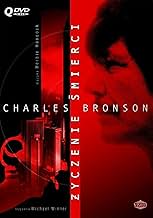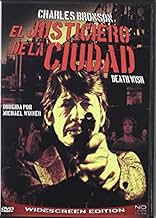Um arquiteto da cidade de Nova Iorque torna-se num vigilante depois que sua esposa é assassinada.Um arquiteto da cidade de Nova Iorque torna-se num vigilante depois que sua esposa é assassinada.Um arquiteto da cidade de Nova Iorque torna-se num vigilante depois que sua esposa é assassinada.
- Direção
- Roteiristas
- Artistas
- Prêmios
- 1 vitória e 2 indicações no total
- District Attorney
- (as Fred Scollay)
- Lt. Briggs
- (as Ed Grover)
- Direção
- Roteiristas
- Elenco e equipe completos
- Produção, bilheteria e muito mais no IMDbPro
Avaliações em destaque
Charles Bronson is Paul Kersey, a New York architect whose wife is killed by a group of muggers ransacking their apartment, an attack that also leaves his daughter catatonic. The killers are never caught, and Kersey is left shattered.
He takes a job working for a land developer in New Mexico to get his mind off his troubles, and while there his long dormant fascination with guns is renewed when his client Ames Jainchill (Stuart Margolin) shows off his personal collection and lets him crack some shots off. He also witnesses a live reenactment of an Old West shootout, where frontier justice was administered at the end of the gun.
Kersey soon arrives back in New York, livened up a bit from his visit and ready to resume his life. But the streets are still filled with thugs, and Kersey knows that Manhattan is not the best place to be at night. He discovers that Jainchill has given him a .32 revolver as a present, and subsequently uses it to kill a man trying to mug him. Kersey soon realizes the cathartic release of enacting vigilante revenge as the media reports his killings and other private citizens take action, all while police officer Frank Ochoa (Vincent Gardenia) leads a task force to capture the vigilante and stop future violence.
"Death Wish" was a product of its day -- a Nixon-era knee jerk reaction to rampant crime that turned out to be quite a hit. But to dismiss it simply as that would be to deny the film its true power. It asks the question of whether or not vigilantism can be used as a social good, and just how can a citizen properly defend himself from criminal attacks. More importantly, to the movie's credit it does introduce the downside of vigilantism, with Ochoa worrying that people will be whipped into such a frenzy that they'll start attacking anyone who looks suspicious.
The movie does play it safe when it comes to Kersey's "victims" however. Every one of them is clearly a mugger, threatening his life or just wanting his money. But the movie does enter into ambiguous territory by looking at the actual actions Kersey takes. At first he just stumbles into traps set up by muggers or happens on a crime taking place; later on the other hand it's clear that he's actually inviting attacks by making himself a target. And the self-defense aspect of his actions becomes equally cloudy when he kills muggers that are already fleeing. He wants to punish them for their crimes, which itself can be morally troubling.
But to understand "Death Wish" you had to understand the times. Murder rates were very high in New York City, and many muggers had little problem killing their victims. The criminals in the film are not overly sympathetic either, most of them clearly hippies or other social undesirables, probably hooked on drugs from their "free love" days and now stuck in the bitter reality of narcotic dependency now that the good times are over. It's hard to feel sorry for someone willing to kill you just for a couple hours worth of pleasure. I'm sure the movie's audiences in New York, and probably across the country, enjoyed living out their revenge fantasies vicariously through Kersey.
It should be said that Bronson, normally criticized as a wooden actor, gives a remarkably strong performance. This may be due to his friendship with director Michael Winner, who also helmed several of his other films. But it's probably due to the fact that the movie was not written as an action hero vehicle, and because of this the story demanded a character more grounded in reality. Kersey is not a superhero -- he's just one man trying to make a difference in the world.
Also, he's not all there, either. The movie makes it clear that Kersey is a little deranged as well, and one wonders just how far he might go to do what he thinks is right. The sequels were more interested in making him out to be an infallible crusader against evil, abandoning any pretext of social commentary and just offering body counts, but here at least the movie shows that someone willing to go on a shooting spree isn't quite right in the head, regardless of the guilt of his victims.
Supporting roles are excellent as well. A very young Jeff Goldblum nails his performance as one of the muggers who invades Kersey's apartment, immediately scary and repellent. Gardenia is a nice foil for Bronson, making Ochoa an intelligent officer not unsympathetic to Kersey's crusade, especially when he sees how the crime rate plummets following the killings. Christopher Guest, who would go on to star in hit mockumentaries like "This is Spinal Tap," "Best in Show" and "A Mighty Wind" has a small but memorable role as a police officer towards the end of the movie. In fact, everyone does a good job.
Ultimately, your enjoyment of "Death Wish" will probably rely both on your politics and views toward crime. It's a movie where the critic is judged based on his review, which is just as well I suppose. It's at once fascinating, and still very timely.
Nine out of ten stars. Bronson's best solo movie and certainly a very thought-provoking piece, which is lost on both people who only want to watch it for the mugger killings and those who just dismiss it a fascist trash.
Not only is this the film debut of both Jeff Goldblum and Denzel Washington, it is possibly the greatest revenge film of all time. A mild-mannered veteran -- now working as an architect of all things -- going ballistic? Awesome! I have no idea why I waited so long to see this movie... it kicks all kinds of butt, and presents a very interesting amoral picture. Not immoral, but amoral. Do you cheer him on or hope he gets caught? It is a timeless dilemma.
Rather than Bronson's performance Death Wish has its significant themes and screenplay components which were used at almost every action/crime movie later on, thus became clichés of their genre. Spending a lot of the running time through the bad guys' side is the most fundamental component. This development was so modern and original, after a while it changed the outlook of the Crime genre.
Death Wish is nearly as good as Eastwood's Dirty Harry, with just a different taste. Obviously, this should have been produced only once; since the sequels misrepresented its purpose.
In this the original Death Wish, Charles Bronson introduces us to Paul Kersey, successful architect and family man with wife Hope Lange and married daughter Kathleen Tolan. Bronson's well ordered life takes an abrupt change when a home invasion robbery results in the death of Hope Lange and the rape of Kathleen Tolan.
All the acting is done with facial expressions here. Bronson usually plays stoic characters in his films, but in the Death Wish series he never articulates what's going on with him, but you see it in a face that was made for movie closeups in the same way that Gary Cooper's and John Wayne's faces were.
A trip out west on a project brings him in touch with a different mentality about settling urban problems and the present of a 32 Caliber pistol from the man he was contracted to work for gives Bronson a whole new outlook. And a mission in life to rid the world of street criminals.
1974 may have been the year Richard Nixon had his downfall, but this was the president elected on a law and order platform. George Wallace sent his audiences into delight when he talked about running protesters down with his vehicle. Death Wish struck quite a nerve with the American public because unlike Dirty Harry, Bronson was a citizen like you and me who just decided to act.
There are two really good supporting performances in Death Wish. A New Yorker to his fingertips, Vincent Gardenia plays the dogged police detective who's put on the vigilante killer case. And Stuart Margolin as Bronson's western host who presents him with the tool of his trade is also worth noting.
In 1982 Bronson finally due to a lot of audience demand and the fact that the money was too good to turn down, repeated his role of Paul Kersey in a series of Death Wish films of varying quality. Nothing like this one though.
This was a very, very simple story and it panders to our base instincts which is probably why it was so successful. Most people want justice, and they want it now....which is what this movie preaches. At the time, the movie was shocking. If it came out today, it wouldn't have nearly the impact. However, the early scene of the mother and daughter raped and killed is still horrifying. That will never change.
The story then slows down as we see the transformation of the husband, from conscientious objector to vigilante. When Charles Bronson hits the streets, the film picks up big-time. The movie also ends on a very satisfying note.
Você sabia?
- CuriosidadesAfter finishing Jogo Sujo (1973), Charles Bronson and Michael Winner wanted to make another film together, and were discussing further projects. "What do we do next?" asked Bronson. "The best script I've got is 'Death Wish'. It's about a man whose wife and daughter are mugged and he goes out and shoots muggers," said Winner. "I'd like to do that," Bronson said. "The film?" asked Winner. Bronson replied, "No . . . shoot muggers."
- Erros de gravaçãoKersey's first shooting victim is hit in the abdomen, but a police investigator at the crime scene the next morning refers to a bullet hole in his chest.
- Citações
Paul Kersey: Nothing to do but cut and run, huh? What else? What about the old American social custom of self-defense? If the police don't defend us, maybe we ought to do it ourselves.
Jack Toby: We're not pioneers anymore, Dad.
Paul Kersey: What are we, Jack?
Jack Toby: What do you mean?
Paul Kersey: I mean, if we're not pioneers, what have we become? What do you call people who, when they're faced with a condition or fear, do nothing about it. They just run and hide?
Jack Toby: Civilized?
Paul Kersey: No.
- Cenas durante ou pós-créditosActresses Olympia Dukakis ('Cop at the Precinct') and Marcia Jean Kurtz as Marcia Jean-Kurtz ('Woman at Airport') get credited in opening credits only. There's no mention of them in the closing credits.
- Versões alternativasThe UK version classified in 2006 by the British Board of Film Classification retained the 18 certificate, but all of the BBFC's previous cuts were waived.
- ConexõesFeatured in Precious Images (1986)
- Trilhas sonorasDeath Wish (Main Title)
Written and Performed by Herbie Hancock
Principais escolhas
Detalhes
- Data de lançamento
- País de origem
- Idiomas
- Também conhecido como
- El vengador anónimo
- Locações de filme
- Bear Down Gym, University of Arizona, Tucson, Arizona, EUA(basement firing range)
- Empresas de produção
- Consulte mais créditos da empresa na IMDbPro
Bilheteria
- Orçamento
- US$ 3.000.000 (estimativa)
- Faturamento bruto nos EUA e Canadá
- US$ 22.000.000
- Faturamento bruto mundial
- US$ 22.000.000
- Tempo de duração
- 1 h 33 min(93 min)
- Mixagem de som
- Proporção
- 1.85 : 1




































